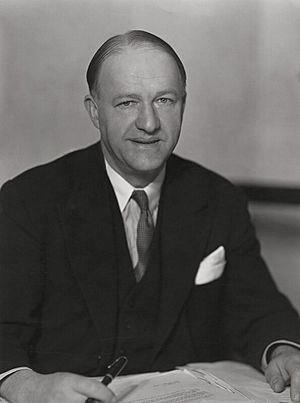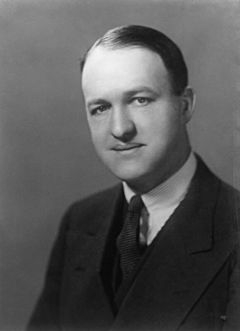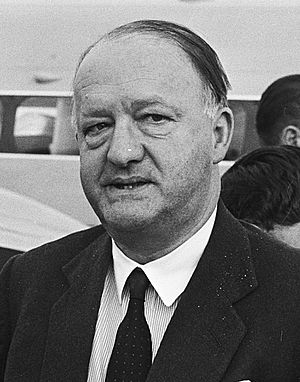Rab Butler facts for kids
Quick facts for kids
The Lord Butler of Saffron Walden
|
|||||||||||||||||||||||||||||||||||||||||||||||||||||||||||||||||
|---|---|---|---|---|---|---|---|---|---|---|---|---|---|---|---|---|---|---|---|---|---|---|---|---|---|---|---|---|---|---|---|---|---|---|---|---|---|---|---|---|---|---|---|---|---|---|---|---|---|---|---|---|---|---|---|---|---|---|---|---|---|---|---|---|---|

Rab Butler in 1951
|
|||||||||||||||||||||||||||||||||||||||||||||||||||||||||||||||||
| Deputy Prime Minister of the United Kingdom | |||||||||||||||||||||||||||||||||||||||||||||||||||||||||||||||||
| De facto 13 July 1962 – 18 October 1963 |
|||||||||||||||||||||||||||||||||||||||||||||||||||||||||||||||||
| Prime Minister | Harold Macmillan | ||||||||||||||||||||||||||||||||||||||||||||||||||||||||||||||||
| Preceded by | Anthony Eden (de facto) | ||||||||||||||||||||||||||||||||||||||||||||||||||||||||||||||||
| Succeeded by | Willie Whitelaw (de facto) | ||||||||||||||||||||||||||||||||||||||||||||||||||||||||||||||||
| First Secretary of State | |||||||||||||||||||||||||||||||||||||||||||||||||||||||||||||||||
| In office 13 July 1962 – 18 October 1963 |
|||||||||||||||||||||||||||||||||||||||||||||||||||||||||||||||||
| Prime Minister | Harold Macmillan | ||||||||||||||||||||||||||||||||||||||||||||||||||||||||||||||||
| Preceded by | Office established | ||||||||||||||||||||||||||||||||||||||||||||||||||||||||||||||||
| Succeeded by | George Brown (1964) | ||||||||||||||||||||||||||||||||||||||||||||||||||||||||||||||||
|
|||||||||||||||||||||||||||||||||||||||||||||||||||||||||||||||||
|
|||||||||||||||||||||||||||||||||||||||||||||||||||||||||||||||||
|
|||||||||||||||||||||||||||||||||||||||||||||||||||||||||||||||||
|
|||||||||||||||||||||||||||||||||||||||||||||||||||||||||||||||||
| Personal details | |||||||||||||||||||||||||||||||||||||||||||||||||||||||||||||||||
| Born |
Richard Austen Butler
9 December 1902 Attock Serai, British India (now Attock, Pakistan) |
||||||||||||||||||||||||||||||||||||||||||||||||||||||||||||||||
| Died | 8 March 1982 (aged 79) Great Yeldham, Essex, England |
||||||||||||||||||||||||||||||||||||||||||||||||||||||||||||||||
| Resting place | St Mary the Virgin, Saffron Walden | ||||||||||||||||||||||||||||||||||||||||||||||||||||||||||||||||
| Nationality | British | ||||||||||||||||||||||||||||||||||||||||||||||||||||||||||||||||
| Political party | Conservative | ||||||||||||||||||||||||||||||||||||||||||||||||||||||||||||||||
| Spouses |
Sydney Elizabeth Courtauld
(m. 1926; died 1954)Mollie Courtauld
(m. 1959) |
||||||||||||||||||||||||||||||||||||||||||||||||||||||||||||||||
| Children | 4, including Adam (by Sydney Courtauld) | ||||||||||||||||||||||||||||||||||||||||||||||||||||||||||||||||
| Parent | Montagu Sherard Dawes Butler (father) | ||||||||||||||||||||||||||||||||||||||||||||||||||||||||||||||||
| Academic background | |||||||||||||||||||||||||||||||||||||||||||||||||||||||||||||||||
| Alma mater | Pembroke College, Cambridge | ||||||||||||||||||||||||||||||||||||||||||||||||||||||||||||||||
| Academic work | |||||||||||||||||||||||||||||||||||||||||||||||||||||||||||||||||
| Institutions | |||||||||||||||||||||||||||||||||||||||||||||||||||||||||||||||||
| Main interests | |||||||||||||||||||||||||||||||||||||||||||||||||||||||||||||||||
Richard Austen Butler, also known as R. A. Butler or Rab, was a very important British politician from the Conservative Party. He was born on December 9, 1902, and passed away on March 8, 1982. Many people remember him for creating the modern education system in the UK. He also played a big part in helping the Conservative Party become strong again after World War II.
Rab Butler had a long career in government. He held many top jobs, like Chancellor of the Exchequer (in charge of the country's money), Home Secretary (in charge of law and order), and Foreign Secretary (in charge of relations with other countries). He was one of only two politicians who held three of the four most important government jobs but never became Prime Minister.
After he left politics in 1965, he became the Master of Trinity College, Cambridge, a famous university college.
Contents
- Family and Early Life
- Starting His Political Journey
- Education Minister and Big Changes
- After the War: Rebuilding the Party
- Chancellor of the Exchequer
- Under Prime Minister Eden
- Becoming Prime Minister: Missed Chances
- Working with Macmillan
- Another Chance at Prime Minister
- Foreign Secretary Under Douglas-Home
- Life After Politics
- Personal Life
Family and Early Life
Rab Butler came from a family with a long history at the University of Cambridge. His great-grandfather and uncle were also important figures there. His father was the Master of Pembroke College, Cambridge.
Rab was born in Attock, British India, on December 9, 1902. His father worked for the Indian Civil Service. When he was six, he broke his arm in a riding accident. This left his right hand permanently affected.
He went to Marlborough College and later studied at Pembroke College, Cambridge. He was very good at his studies, especially history. He even became the President of the Cambridge Union Society. After graduating, he became a fellow at Corpus Christi College, Cambridge.
In 1926, he married Sydney Courtauld. Her family was wealthy, which gave him the financial freedom to start a career in politics.
Starting His Political Journey
Rab Butler was elected to Parliament in 1929, representing Saffron Walden. He held this seat until he retired in 1965.
Early in his career, he worked as a private secretary. In 1932, he became the Under-Secretary of State for India. He helped pass the Government of India Act 1935. This law gave more power to Indian people in their own government. He was the youngest member of the government at 29 years old.
In 1937, he moved to the Ministry of Labour.
Foreign Office Role
In 1938, Butler became the Under-Secretary of State for Foreign Affairs. This meant he spoke for the Foreign Office in the House of Commons. During this time, he was involved in discussions about Nazi Germany. He supported trying to avoid war through talks, a policy known as "appeasement."
After Germany took over Czechoslovakia in 1939, Britain changed its approach. It promised to defend countries like Poland. Butler, however, still hoped for peaceful solutions. He became a Privy Councillor in 1939, being the youngest person to receive this honor since Winston Churchill.
When World War II began, Butler continued to work in the Foreign Office. He later grew to respect Prime Minister Winston Churchill, even though they had different views at times.
Education Minister and Big Changes
In July 1941, Rab Butler got his first Cabinet job as President of the Board of Education. This was a very important role. He led a major reform of the education system.
Working on Education Reform
The biggest challenge was how to include church schools in the state system. Many church schools were old and needed repairs. Butler worked hard to find a solution that would satisfy both the Church of England and other religious groups.
He proposed that church schools could either get 50% funding from the government or be fully funded. If fully funded, the local education authority would have more control. Most Church of England schools chose to be fully funded.
Butler also thought about including private (fee-paying) schools in the state system. He believed this would improve standards for everyone. However, this idea did not happen.
The Butler Act of 1944
Butler's efforts led to the famous Education Act 1944, often called the "Butler Act." This law brought in free secondary education for all children. Before this, many grammar schools charged fees.
The Act also created the Tripartite System. This system used the eleven plus exam to decide which type of secondary school children would attend. It also increased the school leaving age to 15. This was a huge step forward for education in Britain.
In 1945, after the war in Europe ended, Butler briefly served as Minister of Labour.
After the War: Rebuilding the Party
After the Conservative Party lost the 1945 election, Butler played a key role in rebuilding it. He became the Chairman of the Conservative Research Department. He helped create new policies for the party.
He supported ideas like full employment and accepting the welfare state. He believed in a "mixed economy" where the government had some control alongside private businesses.
Chancellor of the Exchequer
When the Conservatives won the election in 1951, Butler became Chancellor of the Exchequer. This meant he was in charge of the country's money. Britain was facing economic problems at the time.
He continued many of the economic policies of the previous Labour government. This led to the term "Butskellism" being used. It described how both Conservative and Labour governments had similar economic approaches.
Butler was appointed to the Order of the Companions of Honour in 1954 for his service.
Under Prime Minister Eden
In 1955, Anthony Eden became Prime Minister. Butler initially stayed as Chancellor. However, the economy faced challenges, and his budget decisions were criticized.
In December 1955, Butler moved to the role of Lord Privy Seal and Leader of the House of Commons. He often acted as a deputy for Eden.
Suez Crisis Role
During the Suez Crisis in 1956, when Egypt took control of the Suez Canal, Butler was not fully involved in the initial decisions. He seemed to have doubts about Eden's plan to use force. He tried to encourage a peaceful solution through the United Nations.
His actions during this time made some people in his party see him as disloyal. He later admitted he should have resigned if he disagreed so strongly.
Becoming Prime Minister: Missed Chances
When Anthony Eden resigned in January 1957, many expected Butler to become the next Prime Minister. However, the Conservative Party did not have a formal way to choose a leader back then. Instead, senior figures advised Queen Elizabeth II.
Harold Macmillan was chosen instead of Butler. This surprised many people, including Butler himself. He later said he was "not surprised," but he had actually expected to be chosen. Some believed his past actions during the Suez Crisis and his reputation for being indecisive hurt his chances.
Working with Macmillan
Home Secretary Reforms
Under Macmillan, Butler became the Home Secretary. He held this job for five years. He had liberal views on issues like hanging (capital punishment) and flogging. He chose not to bring back corporal punishment.
He also introduced the first laws to control immigration in 1962. This was a big change at the time. Many people, including Enoch Powell, praised Butler for his work as a reforming Home Secretary.
Other Important Roles
Butler held several other important jobs during these years. In 1959, he became the Chairman of the Conservative Party. This meant he had to speak out against the Labour Party.
He also supported Britain joining the European Economic Community (EEC). In 1962, he became the first First Secretary of State. This role was created to be a kind of deputy prime minister.
Another Chance at Prime Minister
In October 1963, Prime Minister Macmillan became ill and decided to resign. Once again, Butler was seen as the most likely person to take over.
During the Conservative Party Conference, Butler gave the leader's speech. However, his delivery was described as "monotonous and ineffective."
Macmillan, from his hospital bed, set up a process to find a new leader. He asked various groups within the party for their opinions. This process was called "taking soundings."
The Decision is Made
Despite Butler being a strong candidate, Lord Home was chosen as the new Prime Minister. This decision was controversial. Some felt the process was not fair.
Butler was disappointed but agreed to serve under Home. He later said he did not want to cause a split in the party. This decision meant he missed out on becoming Prime Minister for a second time.
Foreign Secretary Under Douglas-Home
Home appointed Butler as Foreign Secretary. This was a job Butler had always wanted. He was known for being able to speak fluent French.
In 1964, Britain held a general election. Butler played a smaller role in the campaign. The Conservatives lost the election. Many people, including the Labour leader Harold Wilson, believed Butler would have won the election if he had been Prime Minister.
At 61, Butler left office with a very long record of government experience.
Life After Politics
Master of Trinity College
In 1965, Rab Butler became the Master of Trinity College, Cambridge. This was a prestigious academic role. He was the first Master in 250 years who had not studied at the college himself.
During his time as Master, Charles, Prince of Wales, studied at Trinity. Butler advised Prince Charles to live in the college and study for a normal degree, just like other students. Butler was later recognized for his guidance of the young Prince.
Butler was also the first Chancellor of the University of Essex and Chancellor of the University of Sheffield.
Later Years and Legacy
In 1971, Butler published his memoirs, The Art of the Possible. He also chaired a committee on mentally abnormal offenders, which suggested big changes to the law.
As he got older, his health declined. He passed away in March 1982 from colon cancer. He is buried in Saffron Walden.
Rab Butler is remembered for his important contributions to British politics. His 1944 Education Act is still a major part of the UK's education system. He also helped reshape the Conservative Party after the war. Many people believe he was one of the most talented politicians of his time, even though he never reached the very top job of Prime Minister.
Personal Life
Rab Butler married Sydney Elizabeth Courtauld in 1926. She was from a wealthy family. They had four children:
- Sir Richard Clive Butler (1929–2012)
- Sir Adam Cortauld Butler (1931–2008)
- Samuel James Butler (1936–2015)
- Sarah Teresa Butler (born 1944)
Sydney passed away in 1954. In 1959, Butler married Mollie Courtauld. She lived to be 101 years old.
His son, Adam Butler, also became a Member of Parliament. His grandson, Ed Butler, became a Brigadier in the army.
 | Kyle Baker |
 | Joseph Yoakum |
 | Laura Wheeler Waring |
 | Henry Ossawa Tanner |



